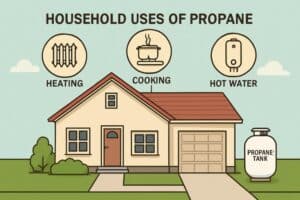Table of Contents
- What Is Propane and How Is It Used in Homes?
- Benefits of Using Propane in Residential Spaces
- Safety Tips for Home Propane Usage
- Boosting Efficiency with Propane Appliances
- Environmental Considerations and Clean Energy Advances
- Emergency Preparedness: Propane’s Role in Storms and Power Outages
- Latest Trends and Innovations in Propane Technology
- The Future of Propane in Residential Energy Solutions
What Is Propane and How Is It Used in Homes?
Propane is a clean-burning fossil fuel that has become indispensable in countless American homes. Its unique properties make it an exceptional energy source for home heating systems, hot water heaters, kitchen appliances, generators, and even fireplaces. With nearly 5% of U.S. households using propane for at least one major energy function, it’s clear that propane fuels both convenience and comfort for families across the nation. Whether you live in the countryside or a growing suburb, propane is a go-to solution for efficient and reliable residential energy.
One distinct advantage of propane is its accessibility—especially for households not connected to a natural gas grid. Propane can be delivered directly to your home and stored in individual tanks, offering energy flexibility and independence. With services like propane delivery in Downingtown, PA, homeowners gain easy and reliable access to propane without disruption to their daily routines. This portability and service-oriented approach make propane a smart option for a wide variety of living situations.
Benefits of Using Propane in Residential Spaces
Propane offers a cost-effective, efficient solution for households, providing fast, reliable heating and energy savings through high energy content and efficient appliances. It’s especially useful in areas without municipal gas, offering flexibility and independence. Its storage ensures continuous service, supporting outdoor upgrades like patio and pool heaters. Propane is also eco-friendlier than oil or coal, emitting fewer greenhouse gases and almost no sulfur. Regular maintenance and modern appliances enhance its sustainability benefits.

Safety Tips for Home Propane Usage
Like any fuel source, propane requires careful handling for safe use. Start by ensuring that all propane-powered appliances are installed and maintained by certified professionals to guarantee adherence to safety standards. Installation of carbon monoxide detectors in key areas around propane appliances is essential for early detection of potential leaks and maintaining indoor air quality.
Store propane tanks outdoors in a well-ventilated location, upright and away from direct sunlight or heat sources. Regularly inspect your tanks for any signs of rust, corrosion, or physical damage. If you suspect a leak—indicated by a strong rotten egg smell—evacuate your home immediately and contact professional help; never attempt to locate or fix the leak yourself.
According to the Propane Education & Research Council home safety guide, homeowners can reduce risks substantially by adhering to these proactive measures. Responsible use is critical to making propane a safe and dependable energy solution.
Boosting Efficiency with Propane Appliances
To maximize your investment in propane, select ENERGY STAR-certified appliances whenever possible—they’re designed to use less fuel without compromising performance. Annual professional maintenance, including inspection of burners, hoses, and connections, will help prevent inefficiencies and extend the life of each appliance. Upgrading outdated equipment to modern high-efficiency models can yield immediate energy savings and improve your overall carbon footprint.
- Switch to high-efficiency propane water heaters for faster hot water delivery and reduced costs compared to electric or older tank models.
- Install programmable thermostats to optimize propane heating use only when and where it’s needed.
- Maintain clean vents and ducts to assist your heating appliances in running smoothly and efficiently.
Recent studies from Energy.gov have shown that ENERGY STAR-rated propane water heaters are faster and more cost-effective than many electric alternatives, providing substantial benefits for cost-conscious and eco-minded families alike.
Environmental Considerations and Clean Energy Advances
Propane is recognized for its lower emissions profile compared to other fossil fuels. It produces less carbon monoxide, nitrous oxides, and particulate matter. For homeowners striving to minimize their footprint, propane is an appealing bridge fuel, offering cleaner combustion as sustainable energy solutions evolve. Advances in propane production and storage now include efforts to incorporate biopropane, derived from renewable sources, as well as hybrid systems that combine propane with solar or wind power for even greater reductions in environmental impact.
Innovations in tank design and delivery technology, like remote monitoring through mobile apps, are also making it easier for homeowners to track their propane usage and fuel efficiency. Tools that sync with utility data help users make informed decisions about when to refill tanks or upgrade appliances for optimal efficiency.
Emergency Preparedness: Propane’s Role in Storms and Power Outages
Propane stands out as a vital component in emergency preparedness plans. Unlike electric-powered systems, propane continues to provide energy during blackouts, ensuring essential home services—such as heating, cooking, refrigeration, and hot water—remain operational. Standby propane generators are a popular choice in areas susceptible to severe weather, as they can quickly restore comfort and safety during outages.
Many families make propane-powered appliances a cornerstone of their disaster readiness kits, ensuring peace of mind in the face of unpredictable natural events.
Latest Trends and Innovations in Propane Technology
The propane industry is evolving rapidly. Recent advancements include smart heating systems that integrate seamlessly into home automation platforms, allowing users to control temperature and fuel consumption from anywhere via a smartphone. Tank sensors now transmit real-time data, allowing for proactive ordering and reducing the risk of running out during extremes in weather. There’s also a growing interest in blending propane with renewable energy systems, such as solar hybrid heating, providing eco-friendly and reliable performance.
Homeowners seeking both comfort and control now benefit from propane’s integration into the connected, efficient homes of tomorrow.
The Future of Propane in Residential Energy Solutions
As the demand for reliable, efficient, and low-emission energy options grows, propane is poised to maintain a prominent role in residential solutions. Industry innovations, combined with a broadening focus on sustainability, are positioning propane as both a transitional and long-term energy source for modern homes. As more smart homes emerge and the need for dependable, flexible power continues, propane’s relevance and appeal are expected to increase.
Homeowners in both rural and suburban communities can look forward to enjoying the benefits of propane—reliability, safety, efficiency, and environmental responsibility—for years to come.








